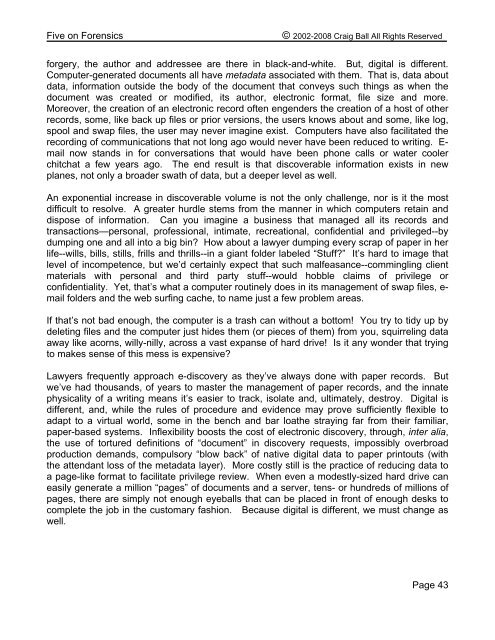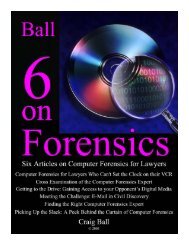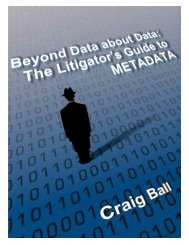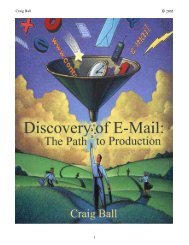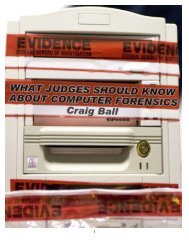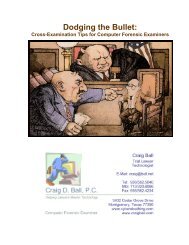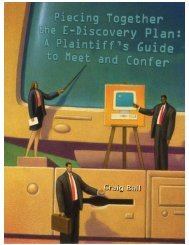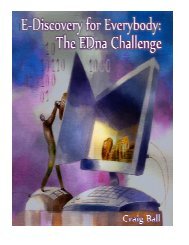Five on Forensics Page 1 - Craig Ball
Five on Forensics Page 1 - Craig Ball
Five on Forensics Page 1 - Craig Ball
Create successful ePaper yourself
Turn your PDF publications into a flip-book with our unique Google optimized e-Paper software.
<str<strong>on</strong>g>Five</str<strong>on</strong>g> <strong>on</strong> <strong>Forensics</strong><br />
© 2002-2008 <strong>Craig</strong> <strong>Ball</strong> All Rights Reserved<br />
forgery, the author and addressee are there in black-and-white. But, digital is different.<br />
Computer-generated documents all have metadata associated with them. That is, data about<br />
data, informati<strong>on</strong> outside the body of the document that c<strong>on</strong>veys such things as when the<br />
document was created or modified, its author, electr<strong>on</strong>ic format, file size and more.<br />
Moreover, the creati<strong>on</strong> of an electr<strong>on</strong>ic record often engenders the creati<strong>on</strong> of a host of other<br />
records, some, like back up files or prior versi<strong>on</strong>s, the users knows about and some, like log,<br />
spool and swap files, the user may never imagine exist. Computers have also facilitated the<br />
recording of communicati<strong>on</strong>s that not l<strong>on</strong>g ago would never have been reduced to writing. E-<br />
mail now stands in for c<strong>on</strong>versati<strong>on</strong>s that would have been ph<strong>on</strong>e calls or water cooler<br />
chitchat a few years ago. The end result is that discoverable informati<strong>on</strong> exists in new<br />
planes, not <strong>on</strong>ly a broader swath of data, but a deeper level as well.<br />
An exp<strong>on</strong>ential increase in discoverable volume is not the <strong>on</strong>ly challenge, nor is it the most<br />
difficult to resolve. A greater hurdle stems from the manner in which computers retain and<br />
dispose of informati<strong>on</strong>. Can you imagine a business that managed all its records and<br />
transacti<strong>on</strong>s—pers<strong>on</strong>al, professi<strong>on</strong>al, intimate, recreati<strong>on</strong>al, c<strong>on</strong>fidential and privileged--by<br />
dumping <strong>on</strong>e and all into a big bin? How about a lawyer dumping every scrap of paper in her<br />
life--wills, bills, stills, frills and thrills--in a giant folder labeled “Stuff?” It’s hard to image that<br />
level of incompetence, but we’d certainly expect that such malfeasance--commingling client<br />
materials with pers<strong>on</strong>al and third party stuff--would hobble claims of privilege or<br />
c<strong>on</strong>fidentiality. Yet, that’s what a computer routinely does in its management of swap files, e-<br />
mail folders and the web surfing cache, to name just a few problem areas.<br />
If that’s not bad enough, the computer is a trash can without a bottom! You try to tidy up by<br />
deleting files and the computer just hides them (or pieces of them) from you, squirreling data<br />
away like acorns, willy-nilly, across a vast expanse of hard drive! Is it any w<strong>on</strong>der that trying<br />
to makes sense of this mess is expensive?<br />
Lawyers frequently approach e-discovery as they’ve always d<strong>on</strong>e with paper records. But<br />
we’ve had thousands, of years to master the management of paper records, and the innate<br />
physicality of a writing means it’s easier to track, isolate and, ultimately, destroy. Digital is<br />
different, and, while the rules of procedure and evidence may prove sufficiently flexible to<br />
adapt to a virtual world, some in the bench and bar loathe straying far from their familiar,<br />
paper-based systems. Inflexibility boosts the cost of electr<strong>on</strong>ic discovery, through, inter alia,<br />
the use of tortured definiti<strong>on</strong>s of “document” in discovery requests, impossibly overbroad<br />
producti<strong>on</strong> demands, compulsory “blow back” of native digital data to paper printouts (with<br />
the attendant loss of the metadata layer). More costly still is the practice of reducing data to<br />
a page-like format to facilitate privilege review. When even a modestly-sized hard drive can<br />
easily generate a milli<strong>on</strong> “pages” of documents and a server, tens- or hundreds of milli<strong>on</strong>s of<br />
pages, there are simply not enough eyeballs that can be placed in fr<strong>on</strong>t of enough desks to<br />
complete the job in the customary fashi<strong>on</strong>. Because digital is different, we must change as<br />
well.<br />
<strong>Page</strong> 43


